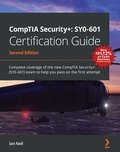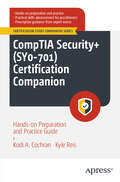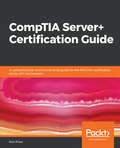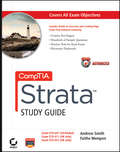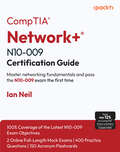- Table View
- List View
CompTIA Security+ Practice Tests SY0-501: Practice tests in 4 different formats and 6 cheat sheets to help you pass the CompTIA Security+ exam
by Ian NeilLearn from Ian Neil, one of the world's top CompTIA Security+ trainers in the world, and enhance your analytical skills to pass the CompTIA Security+ SY0-501 exam Key Features Become a pro at answering questions from all six of the domains of the SY0-501 exam Learn about cryptography algorithms, security policies, and their real-world implementations Solve practice tests that complement the official CompTIA Security+ certification exam Book Description CompTIA Security+ is a core security certification that will validate your baseline skills for a career in cybersecurity. Passing this exam will not only help you identify security incidents but will also equip you to resolve them efficiently. This book builds on the popular CompTIA Security+ Certification Guide, which mirrors the SY0-501 exam pattern. This practice test-based guide covers all six domains of the Security+ SY0-501 exam: threats, attacks, and vulnerabilities; technologies and tools; architecture and design; identity and access management; cryptography and PKI; and risk management. You'll take six mock tests designed as per the official Security+ certification exam pattern, each covering significant aspects from an examination point of view. For each domain, the book provides a dedicated cheat sheet that includes important concepts covered in the test. You can even time your tests to simulate the actual exam. These tests will help you identify gaps in your knowledge and discover answers to tricky exam questions. By the end of this book, you'll have developed and enhanced the skills necessary to pass the official CompTIA Security+ exam. What you will learn Understand how prepared you are for the CompTIA Security+ certification Identify different types of security threats, attacks, and vulnerabilities Explore identity and access management in an enterprise environment Protect your business tools and platforms from cyberattacks Create and maintain a secure network Understand how you can protect your data Discover encryption techniques required to protect against various cyber threat scenarios Who this book is for If you are a security administrator, a system or network administrator, or anyone who wants to pass the CompTIA Security+ exam, this book is for you. This book is an ideal resource for students who want a career or degree in cybersecurity or are studying for the CISSP certification exam.
CompTIA Security+ Practice Tests: Exam SY0-501
by Chuck Easttom S. Russell Christy1,000 Challenging practice questions for Exam SY0-501 CompTIA Security+ Practice Tests provides invaluable practice for candidates preparing for Exam SY0-501. Covering 100% of exam objectives, this book provides 1,000 practice questions to help you test your knowledge and maximize your performance well in advance of exam day. Whether used alone or as a companion to the CompTIA Security+ Study Guide, these questions help reinforce what you know while revealing weak areas while there’s still time to review. Six unique practice tests plus one bonus practice exam cover threats, attacks, and vulnerabilities; technologies and tools; architecture and design; identity and access management; risk management; and cryptography and PKI to give you a comprehensive preparation resource. Receive one year of FREE access to the Sybex online interactive learning environment, to help you prepare with superior study tools that allow you to gauge your readiness and avoid surprises on exam day. The CompTIA Security+ certification is internationally-recognized as validation of security knowledge and skills. The exam tests your ability to install and configure secure applications, networks, and devices; analyze, respond to, and mitigate threats; and operate within applicable policies, laws, and regulations. This book provides the practice you need to pass with flying colors. Master all six CompTIA Security+ objective domains Test your knowledge with 1,000 challenging practice questions Identify areas in need of further review Practice test-taking strategies to go into the exam with confidence The job market for information security professionals is thriving, and will only expand as threats become more sophisticated and more numerous. Employers need proof of a candidate’s qualifications, and the CompTIA Security+ certification shows that you’ve mastered security fundamentals in both concept and practice. If you’re ready to take on the challenge of defending the world’s data, CompTIA Security+ Practice Tests is an essential resource for thorough exam preparation.
CompTIA Security+ Practice Tests: Exam SY0-601
by David SeidlGet ready for a career in IT security and efficiently prepare for the SY0-601 exam with a single, comprehensive resource CompTIA Security+ Practice Tests: Exam SY0-601, Second Edition efficiently prepares you for the CompTIA Security+ SY0-601 Exam with one practice exam and domain-by-domain questions. With a total of 1,000 practice questions, you’ll be as prepared as possible to take Exam SY0-601. Written by accomplished author and IT security expert David Seidl, the 2nd Edition of CompTIA Security+ Practice Tests includes questions covering all five crucial domains and objectives on the SY0-601 exam: Attacks, Threats, and Vulnerabilities Architecture and Design Implementation Operations and Incident Response Governance, Risk, and Compliance Perfect for anyone looking to prepare for the SY0-601 Exam, upgrade their skills by earning a high-level security certification (like CASP+, CISSP, or CISA), as well as anyone hoping to get into the IT security field, CompTIA Security+ Practice Tests allows for efficient and comprehensive preparation and study.
CompTIA Security+ Practice Tests: Exam SY0-701 (Sybex Study Guide Ser.)
by David SeidlPrepare for the Security+ certification exam confidently and quickly CompTIA Security+ Practice Tests: Exam SY0-701, Third Edition, prepares you for the newly updated CompTIA Security+ exam. You'll focus on challenging areas and get ready to ace the exam and earn your Security+ certification. This essential collection of practice tests contains study questions covering every single objective domain included on the SY0-701. Comprehensive coverage of every essential exam topic guarantees that you'll know what to expect on exam day, minimize test anxiety, and maximize your chances of success. You'll find 1000 practice questions on topics like general security concepts, threats, vulnerabilities, mitigations, security architecture, security operations, and security program oversight. You'll also find: Complimentary access to the Sybex test bank and interactive learning environment Clear and accurate answers, complete with explanations and discussions of exam objectives Material that integrates with the CompTIA Security+ Study Guide: Exam SY0-701, Ninth Edition The questions contained in CompTIA Security+ Practice Tests increase comprehension, strengthen your retention, and measure overall knowledge. It's an indispensable part of any complete study plan for Security+ certification. And save 10% when you purchase your CompTIA exam voucher with our exclusive WILEY10 coupon code.
CompTIA Security+ Review Guide: Exam SY0-601
by James Michael StewartLearn the ins and outs of the IT security field and efficiently prepare for the CompTIA Security+ Exam SY0-601 with one easy-to-follow resource CompTIA Security+ Review Guide: Exam SY0-601, Fifth Edition helps you to efficiently review for the leading IT security certification—CompTIA Security+ SY0-601. Accomplished author and security expert James Michael Stewart covers each domain in a straightforward and practical way, ensuring that you grasp and understand the objectives as quickly as possible. Whether you’re refreshing your knowledge or doing a last-minute review right before taking the exam, this guide includes access to a companion online test bank that offers hundreds of practice questions, flashcards, and glossary terms. Covering all five domains tested by Exam SY0-601, this guide reviews: Attacks, Threats, and Vulnerabilities Architecture and Design Implementation Operations and Incident Response Governance, Risk, and Compliance This newly updated Fifth Edition of CompTIA Security+ Review Guide: Exam SY0-601 is not just perfect for anyone hoping to take the SY0-601 Exam, but it is also an excellent resource for those wondering about entering the IT security field.
CompTIA Security+ Review Guide: Exam Sy0-501
by James M. StewartConsolidate your knowledge base with critical Security+ review CompTIA Security+ Review Guide, Fourth Edition, is the smart candidate's secret weapon for passing Exam SY0-501 with flying colors. You've worked through your study guide, but are you sure you're prepared? This book provides tight, concise reviews of all essential topics throughout each of the exam's six domains to help you reinforce what you know. Take the pre-assessment test to identify your weak areas while there is still time to review, and use your remaining prep time to turn weaknesses into strengths. The Sybex online learning environment gives you access to portable study aids, including electronic flashcards and a glossary of key terms, so you can review on the go. Hundreds of practice questions allow you to gauge your readiness, and give you a preview of the big day. Avoid exam-day surprises by reviewing with the makers of the test—this review guide is fully approved and endorsed by CompTIA, so you can be sure that it accurately reflects the latest version of the exam. The perfect companion to the CompTIA Security+ Study Guide, Seventh Edition, this review guide can be used with any study guide to help you: Review the critical points of each exam topic area Ensure your understanding of how concepts translate into tasks Brush up on essential terminology, processes, and skills Test your readiness with hundreds of practice questions You've put in the time, gained hands-on experience, and now it's time to prove what you know. The CompTIA Security+ certification tells employers that you're the person they need to keep their data secure; with threats becoming more and more sophisticated, the demand for your skills will only continue to grow. Don't leave anything to chance on exam day—be absolutely sure you're prepared with the CompTIA Security+ Review Guide, Fourth Edition.
CompTIA Security+ Study Guide Authorized Courseware
by Emmett DulaneyThe preparation you need for the new CompTIA Security+ exam SY0-301This top-selling study guide helps candidates prepare for exam SY0-301 and certification as a CompTIA Security+ administrator. Inside the new, CompTIA Authorized edition, you'll find complete coverage of all Security+ exam objectives, loads of real-world examples, and a CD packed with cutting-edge exam prep tools. The book covers key exam topics such as general security concepts, infrastructure security, the basics of cryptography, and much more.Provides 100% coverage of all exam objectives for the new CompTIA Security+ exam SY0-301 including: Network security Compliance and operational security Threats and vulnerabilities Application, data and host security Access control and identity management Cryptography Covers key topics such as general security concepts, communication and infrastructure security, the basics of cryptography, operational security, and more Offers practical examples and insights drawn from the real world Includes a CD with two practice exams, all chapter review questions, electronic flashcards, and more Obtain your Security+ certification and jump-start your career. It's possible with the kind of thorough preparation you'll receive from CompTIA Security+ Study Guide, 5th Edition.
CompTIA Security+ Study Guide with over 500 Practice Test Questions: Exam SY0-701 (Sybex Study Guide)
by David Seidl Mike ChappleMaster key exam objectives and crucial cybersecurity concepts for the CompTIA Security+ SY0-701 exam, along with an online test bank with hundreds of practice questions and flashcards In the newly revised ninth edition of CompTIA Security+ Study Guide: Exam SY0-701, veteran cybersecurity professionals and educators Mike Chapple and David Seidl deliver easy-to-follow coverage of the security fundamentals tested by the challenging CompTIA SY0-701 exam. You’ll explore general security concepts, threats, vulnerabilities, mitigations, security architecture and operations, as well as security program management and oversight. You’ll get access to the information you need to start a new career—or advance an existing one—in cybersecurity, with efficient and accurate content. You’ll also find: Practice exams that get you ready to succeed on your first try at the real thing and help you conquer test anxiety Hundreds of review questions that gauge your readiness for the certification exam and help you retain and remember key concepts Complimentary access to the online Sybex learning environment, complete with hundreds of additional practice questions and flashcards, and a glossary of key terms, all supported by Wiley's support agents who are available 24x7 via email or live chat to assist with access and login questions Perfect for everyone planning to take the CompTIA SY0-701 exam, as well as those aiming to secure a higher-level certification like the CASP+, CISSP, or CISA, this study guide will also earn a place on the bookshelves of anyone who’s ever wondered if IT security is right for them. It’s a must-read reference!And save 10% when you purchase your CompTIA exam voucher with our exclusive WILEY10 coupon code.
CompTIA Security+ Study Guide: Exam SY0-601
by David Seidl Mike ChappleLearn the key objectives and most crucial concepts covered by the Security+ Exam SY0-601 with this comprehensive and practical study guide The Eighth Edition of the CompTIA Security+ Study Guide Exam SY0-601 efficiently and comprehensively prepares you for the SY0-601 Exam. Accomplished authors and security experts Mike Chapple and David Seidl walk you through the fundamentals of crucial security topics, including the five domains covered by the SY0-601 Exam: Attacks, Threats, and Vulnerabilities Architecture and Design Implementation Operations and Incident Response Governance, Risk, and Compliance The study guide comes with the Sybex online, interactive learning environment that includes a pre-assessment test, hundreds of review questions, practice exams, flashcards, and a glossary of key terms. The book is written in a practical and straightforward manner, ensuring you can easily learn and retain the material. Perfect for everyone planning to take the SY0-601 Exam—as well as those who hope to secure a high-level certification like the CASP+, CISSP, or CISA—the study guide also belongs on the bookshelves of everyone who has ever wondered if the field of IT security is right for them. It’s a must-have reference!
CompTIA Security+ Study Guide: Exam Sy0-501
by Emmett Dulaney Chuck EasttomExpert preparation covering 100% of Security+ exam SY0-501 objectives CompTIA Security+ Study Guide, Seventh Edition offers invaluable preparation for Exam SY0-501. Written by an expert author team, this book covers 100% of the exam objectives with clear, concise explanation. You'll learn how to handle threats, attacks, and vulnerabilities using industry-standard tools and technologies, while understanding the role of architecture and design. From everyday tasks like identity and access management to complex topics like risk management and cryptography, this study guide helps you consolidate your knowledge base in preparation for the Security+ exam. Practical examples illustrate how these processes play out in real-world scenarios, allowing you to immediately translate essential concepts to on-the-job application. You also gain access to the Sybex online learning environment, which features a robust toolkit for more thorough prep: flashcards, glossary of key terms, practice questions, and a pre-assessment exam equip you with everything you need to enter the exam confident in your skill set. This study guide is approved and endorsed by CompTIA, and has been fully updated to align with the latest version of the exam. Master essential security technologies, tools, and tasks Understand how Security+ concepts are applied in the real world Study on the go with electronic flashcards and more Test your knowledge along the way with hundreds of practice questions To an employer, the CompTIA Security+ certification proves that you have the knowledge base and skill set to secure applications, devices, and networks; analyze and respond to threats; participate in risk mitigation, and so much more. As data threats loom larger every day, the demand for qualified security professionals will only continue to grow. If you're ready to take the first step toward a rewarding career, CompTIA Security+ Study Guide, Seventh Edition is the ideal companion for thorough exam preparation.
CompTIA Security+ Study Guide: SY0-401
by Emmett Dulaney Chuck EasttomJoin over 250,000 IT professionals who've earned Security+ certification If you're an IT professional hoping to progress in your career, then you know that the CompTIA Security+ exam is one of the most valuable certifications available. Since its introduction in 2002, over a quarter million professionals have achieved Security+ certification, itself a springboard to prestigious certifications like the CASP, CISSP, and CISA. The CompTIA Security+ Study Guide: SY0-401 covers 100% of the Security+ exam objectives, with clear and concise information on crucial security topics. You'll find everything you need to prepare for the 2014 version of the Security+ certification exam, including insight from industry experts on a wide range of IT security topics. Readers also get access to a robust set of learning tools, featuring electronic flashcards, assessment tests, robust practice test environment, with hundreds of practice questions, and electronic flashcards. CompTIA authorized and endorsed Includes updates covering the latest changes to the exam, including better preparation for real-world applications Covers key topics like network security, compliance and operational security, threats and vulnerabilities, access control and identity management, and cryptography Employs practical examples and insights to provide real-world context from two leading certification experts Provides the necessary tools to take that first important step toward advanced security certs like CASP, CISSP, and CISA, in addition to satisfying the DoD's 8570 directive If you're serious about jump-starting your security career, you need the kind of thorough preparation included in the CompTIA Security+ Study Guide: SY0-401.
CompTIA Security+: Complete coverage of the new CompTIA Security+ (SY0-601) exam to help you pass on the first attempt, 2nd Edition
by Ian NeilLearn IT security essentials and prepare for the Security+ exam with this CompTIA exam guide, complete with additional online resources—including flashcards, PBQs, and mock exams—at securityplus.trainingKey FeaturesWritten by Ian Neil, one of the world's top CompTIA Security+ trainersTest your knowledge of cybersecurity jargon and acronyms with realistic exam questionsLearn about cryptography, encryption, and security policies to deliver a robust infrastructureBook DescriptionThe CompTIA Security+ certification validates the fundamental knowledge required to perform core security functions and pursue a career in IT security. Authored by Ian Neil, a world-class CompTIA certification trainer, this book is a best-in-class study guide that fully covers the CompTIA Security+ 601 exam objectives. Complete with chapter review questions, realistic mock exams, and worked solutions, this guide will help you master the core concepts to pass the exam the first time you take it. With the help of relevant examples, you'll learn fundamental security concepts from certificates and encryption to identity and access management (IAM). As you progress, you'll delve into the important domains of the exam, including cloud security, threats, attacks and vulnerabilities, technologies and tools, architecture and design, risk management, cryptography, and public key infrastructure (PKI). You can access extra practice materials, including flashcards, performance-based questions, practical labs, mock exams, key terms glossary, and exam tips on the author's website at securityplus.training. By the end of this Security+ book, you'll have gained the knowledge and understanding to take the CompTIA exam with confidence.What you will learnMaster cybersecurity fundamentals, from the CIA triad through to IAMExplore cloud security and techniques used in penetration testingUse different authentication methods and troubleshoot security issuesSecure the devices and applications used by your companyIdentify and protect against various types of malware and virusesProtect yourself against social engineering and advanced attacksUnderstand and implement PKI conceptsDelve into secure application development, deployment, and automationWho this book is forIf you want to take and pass the CompTIA Security+ SY0-601 exam, even if you are not from an IT background, this book is for you. You'll also find this guide useful if you want to become a qualified security professional. This CompTIA book is also ideal for US Government and US Department of Defense personnel seeking cybersecurity certification.
CompTIA Security+: Hands-on Preparation and Practice Guide (Certification Study Companion Series)
by Kodi A. Cochran Kyle ReisThis book covers all topics and requirements of the CompTIA Security+ (SY0-701) certification exam. It will allow readers to easily understand the concepts, information, and skills needed to obtain the associated certification. CompTIA Security+ (SY0-701) is a global certification that validates the baseline skills necessary to perform core security functions and pursue an IT security career. It represents the latest and greatest in cybersecurity, covering the most in-demand skills related to current threats, automation, zero trust, IoT, risk – and more. This book is designed to follow the core requirements of the CompTIA Security+ (SY0-701) certification and thoroughly educated all readers on the domains of Cybersecurity. It has been specifically written to follow the guidelines of the exam, while also incorporating other useful topics that will allows the readers to better understand the material. The book will provide all readers with the appropriate knowledge and information to have a foundational level of security topics. It will primarily serve the newer entrants to the field but will also support more experienced individuals that are looking toward certifications. What You Will Learn: The Role of Cybersecurity Professionals Impact of Cybersecurity on Organizations and Individuals Emerging Trends in Cybersecurity Overview of Security+ Exam Structure and Objectives The CIA Triad: Confidentiality, Integrity, and Availability Attacks, Threats, and Vulnerabilities Network Security Identity and Access Management Authentication Factors: Single Sign-On, Multi-Factor Authentication Endpoint and Application Security Cryptography and PKI Security Operations and Incident Response Governance, Risk, and Compliance Who this book is for: This book is for any and all that are trying to get into the field of information technology or achieve certification with CompTIA, particularly for the Security+. There is no set level of skill, experience, or need that the user will require to obtain useful information from this book.
CompTIA Server+ Study Guide: Exam SK0-005
by Troy McMillanPrepare for the Server+ exam—and an exciting new career in tech—with this hands-on guide In the newly updated Second Edition of the CompTIA Server+ Study Guide: Exam SK0-005, veteran technology educator Troy McMillan delivers a comprehensive, hands-on blueprint for success on the Server+ SK0-005 exam. Learn about essential hardware and software technologies used in on-premise and hybrid server environments and prepare yourself for the exam and real-world, on-the-job challenges. This Study Guide provides you with a solid understanding of how network and cloud storage systems work by helping you learn how to store, protect, and access the data that&’s ever more crucial to modern businesses. Find coverage of every objective tested by the exam, including server hardware installation and management, server administration, security and disaster recovery, and troubleshooting. You also learn: Expert guidance on acing a certification exam is increasing demand amongst high-paying employers Critical performance tips for professionals who want to hit the ground running on their first day on the job Complimentary access to the Sybex interactive online learning environment and test bank, complete with hundreds of practice questions and answers, bonus exams, electronic flashcards, and a searchable glossary of key termsA can&’t-miss resource for anyone preparing for a new role as a server administrator, data storage specialist, or related IT specialty, the CompTIA Server+ Study Guide: Exam SK0-005, Second Edition, will earn a place in the libraries of anyone looking for an efficient and effective way to prep for this challenging and rewarding technical certification.
CompTIA Server+ Study Guide: Exam Sk0-004
by Troy McmillanComprehensive interactive exam preparation plus expert insight from the field CompTIA Server+ Study Guide Exam SK0-004 is your ideal study companion for the SK0-004 exam. With 100% coverage of all exam objectives, this guide walks you through system hardware, software, storage, best practices, disaster recovery, and troubleshooting, with additional coverage of relevant topics including virtualization, big data, cloud storage, security, and scalability. Get an 'in the trenches' view of how server and data storage administration works in a real-world IT environment. From the basics through advanced topics, you'll learn how to deliver world-class solutions in today's evolving organizations by getting under the hood of technologies that enable performance, resiliency, availability, recoverability, and simplicity. Gain access to the Sybex interactive online learning environment, which features electronic flashcards, a searchable glossary, test bank, and bonus practice exams to reinforce what you have learned. Using and understanding in-house storage devices and the cloud has become an urgent skill for any IT professional. This is your comprehensive, expert driven study guide for taking the CompTIA Server+ exam SK0-004 Study 100% of exam objectives and more Understand storage design, implementation, and administration Utilize bonus practice exams and study tools Gain a real-world perspective of data storage technology CompTIA Server+ Study Guide Exam SK0-004 is your ticket to exam day confidence.
CompTIA Server+: A comprehensive, end-to-end study guide for the SK0-004 certification, along with mock exams
by Ron PriceThis book is targeted towards professionals seeking to gain the CompTIA Server+ certification. People coming from a Microsoft background with basic operating system and networking skills will also find this book useful. Basic experience working with system administration is mandatory.
CompTIA Strata Study Guide Authorized Courseware
by Andrew Smith Faithe WempenAn authoritative guide that prepares you for the Strata examThe CompTIA Strata certification relates to computer systems maintenance and is often the stepping stone for progression to CompTIA A+ certification. This study guide offers complete, authoritative coverage of the Strata exam objectives in clear and concise language. With this resource, you'll find all you need to know in order to succeed in the exam. Along with gaining preventative maintenance skills, you will also develop the tools to complete troubleshooting and resolve common issues.Addresses the five key parts of the CompTIA Strata certificationOffers thorough coverage of the Strata exam in a clear and concise mannerPrepares you for troubleshooting and resolving common user issuesFeatures practical examples, exam highlights, and review questions to enhance your learning experienceCompTIA Strata Study Guide is essential reading if you are preparing to take the Strata certification exam.
CompTIA Tech+ CertMike: Exam FC0-U71 (CertMike Get Certified)
by Mike ChapplePrepare for, practice, and pass the CompTIA Tech+ certification exam on your first try In the newly updated second edition of CompTIA Tech+ CertMike: Prepare. Practice. Pass the Test! Get Certified! for exam FC0-U71, veteran IT expert and IT educator, Mike Chapple, skips the fluff and dives straight into exactly what you need to ace the entry-level CompTIA Tech+ certification exam on your first try. Filled with the kind of no-nonsense, straight-to-business info you're looking for, the book includes coverage of every relevant exam domain, a full practice exam, and additional multiple choice practice questions with detailed answer explanations. You'll learn all about IT infrastructure, software development, database use, software installation, network connectivity, and more, as well as how all this valuable knowledge applies to common on-the-job scenarios. You'll also find: Complimentary links to audio recordings of the book's Exam Essentials sections to help you review for the test Access to additional online study tools The information you need to reduce test anxiety and boost your confidence when you walk into the testing room on exam day Prepare smarter and faster for the Tech+ certification exam with proven strategies created by the bestselling Mike Chapple and his team at CertMike. This book's perfect for people just getting interested in information technology and working towards a more advanced certification, like the CompTIA A+ or Security+ credentials. It's also a can't-miss resource for anyone who wants to learn basic computer literacy skills. Grab your copy today!
CompTIA® A+ Core 1 (220-1001) and Core 2 (220-1002) Cert Guide
by Rick McDonaldLearn, prepare, and practice for CompTIA A+ Core 1 (220-1001) and Core 2 (220-1002) exam success with this CompTIA Cert Guide from Pearson IT Certification, a leader in IT Certification learning. Master CompTIA A+ Core 1 (220-1001) and Core 2 (220-1002) exam topics Assess your knowledge with chapter-ending quizzes Review key concepts with exam preparation tasks Practice with realistic exam questions Get practical guidance for next steps and more advanced certifications CompTIA A+ Cert Guide Core 1 (220-1001) and Core 2 (220-1002), 5th Edition is a best-of-breed exam study guide. Leading IT certification instructor Rick McDonald shares preparation hints and test-taking tips, helping you identify areas of weakness and improve both your conceptual knowledge and hands-on skills. Material is presented in a concise manner, focusing on increasing your understanding and retention of exam topics. The book presents you with an organized test preparation routine through the use of proven series elements and techniques. Exam topic lists make referencing easy. Chapter-ending Exam Preparation Tasks help you drill on key concepts you must know thoroughly. Review questions help you assess your knowledge, and a final preparation chapter guides you through tools and resources to help you craft your final study plan. The companion website contains the powerful Pearson Test Prep practice test software, complete with over 600 exam-realistic questions, including quiz, pre-assessment, and post-assessment questions. The assessment engine offers you a wealth of customization options and reporting features, laying out a complete assessment of your knowledge to help you focus your study where it is needed most. Digital Key Terms Flashcards are included for every term in the glossary and help you master each concept.
CompTIA® A+® Rapid Review (Exam 220-801 and Exam 220-802)
by Darril GibsonAssess your readiness for CompTIA A+ Exams 220-801 and 220-802--and quickly identify where you need to focus and practice. This practical, streamlined guide walks you through each exam objective, providing "need to know" checklists, review questions, tips, and links to further study--all designed to help bolster your preparation. Reinforce your exam prep with a Rapid Review of these objectives: Exam 220-801: PC Hardware Networking Laptops Printers Operational Procedures Exam 220-802: Operating Systems Security Mobile Devices Troubleshooting This book is an ideal complement to the in-depth training of the Microsoft Press Training Kit and other exam-prep resources for CompTIA A+ Exams 220-801 and 220-802.
CompTIA® Network+® N10-009 Certification Guide: Master networking fundamentals and pass the N10-009 exam the first time
by Ian NeilGet 100% coverage of the latest CompTIA Network+ N10-009 exam objectives for targeted preparation and unlock online access to 2 full-length mock exams and 400 challenging practice questionsKey FeaturesLearn from Ian Neil, bestselling author and world-class CompTIA trainerBuild a solid foundation in networking with hands-on skills that advance your careerTest your readiness with practice tests that mirror the real examSave on certification costs with an exclusive 12% Network+ exam discount voucher with this bookBook DescriptionLooking to pass the CompTIA Network+ N10-009 exam and advance your IT career? Employers seek certified professionals who can design, secure, and troubleshoot modern networks. Memorizing concepts won’t cut it—you need a practical grasp of networking concepts, and this guide helps you build exactly that. Ian Neil, bestselling author of some of the most trusted CompTIA certification resources and a world-class CompTIA trainer, provides 100% coverage of all N10-009 exam objectives. You’ll start with the networking fundamentals, including the OSI model, topologies, ports, and protocols, then progress to configuring IPv4/IPv6 addressing, routing, switching, VLANs, and wireless networks. You’ll master transmission media and transceivers and strengthen your security expertise with VPNs, IPSec, NAC, IDS/IPS, Zero Trust, and firewalls. Beyond exam prep, this book explores cloud, virtualization, IoT, SDN, and SD-WAN, ensuring you’re prepared for modern IT environments. It helps build your troubleshooting skills using tools such as SNMP, NetFlow, Wireshark, log analysis, and traceroute. With practice questions across 25 chapters, 2 full-length online mock exams, 400 exam-style questions, and a 12% exam discount voucher, this guide equips you with the knowledge, experience, and confidence to earn your Network+ certification on the first try.What you will learnMap OSI layers and TCP/IP protocols to real-world scenariosConfigure routers, switches, and firewalls using IPv4/IPv6 addressingApply cloud, virtualization, and SD-WAN concepts with VPC and Direct ConnectRecognize common ports and protocols such as DNS, DHCP, SNMP, and HTTPSImplement wireless standards (802.11ax/6E), WPA3, and cellular IoTDesign resilient topologies like star, mesh, and spine-leaf architecturesSecure networks with VPNs, IPSec, NAC, and zero trust principlesTroubleshoot using SNMP, NetFlow, packet capture, and tracerouteWho this book is forThis book is for early-career IT professionals preparing for the CompTIA Network+ (N10-009) certification, including network administrators, help desk technicians, and junior systems engineers. Candidates are expected to have 9–12 months of hands-on networking experience and a solid understanding of basic IT concepts, though this guide could also be useful for students and career changers who want to build their foundational networking skills. It’s also valuable for those pursuing further certifications like CompTIA Security+ or vendor-specific networking tracks.
CompTIA® Network+® Rapid Review (Exam N10-005)
by Craig Zacker<p>Assess your readiness for CompTIA Network+ Exam N10-005—and quickly identify where you need to focus and practice. This practical, streamlined guide walks you through each exam objective, providing "need to know" checklists, review questions, tips, and links to further study—all designed to help bolster your preparation.</p>
CompTIA® Security+TM Rapid Review (Exam SY0-301)
by Michael Gregg<p>Assess your readiness for CompTIA Security+ Exam SY0-301—and quickly identify where you need to focus and practice. This practical, streamlined guide walks you through each exam objective, providing "need-to-know" checklists, review questions, tips, and links to further study—all designed to help bolster your preparation.</p>
CompTIA® SecurityX® CAS-005 Certification Guide: Master advanced security strategies and confidently take the new CAS-005 exam
by Mark BirchBecome a cybersecurity expert with comprehensive CAS-005 preparation using this detailed guide packed with practical insights, mock exams, diagrams, and actionable strategies that align with modern enterprise security demandsKey FeaturesStrengthen your grasp of key concepts and real-world security practices across updated exam objectivesGauge your preparedness with over 300 practice questions, flashcards, and mock examsVisualize complex topics with diagrams of AI-driven threats, Zero Trust, cloud security, cryptography, and incident responsePurchase of the print or Kindle book includes a free PDF eBookBook DescriptionAs cyber threats evolve at unprecedented speed and enterprises demand resilient, scalable security architectures, the CompTIA SecurityX CAS-005 Certification Guide stands as the definitive preparation resource for today's security leaders. This expert-led study guide enables senior security professionals to master the full breadth and depth of the new CAS-005 exam objectives. Written by veteran instructor Mark Birch, this guide draws from over 30 years of experience in teaching, consulting, and implementing cybersecurity controls to deliver clear, actionable content across the four core domains: governance, risk, and compliance; security architecture; security engineering; and security operations. It addresses the most pressing security challenges, from AI-driven threats and Zero Trust design to hybrid cloud environments, post-quantum cryptography, and automation. While exploring cutting-edge developments, it reinforces essential practices such as threat modeling, secure SDLC, advanced incident response, and risk management. Beyond comprehensive content coverage, this guide ensures you are fully prepared to pass the exam through exam tips, review questions, and detailed mock exams, helping you build the confidence and situational readiness needed to succeed in the CAS-005 exam and real-world cybersecurity leadership.What you will learnBuild skills in compliance, governance, and risk managementUnderstand key standards such as CSA, ISO27000, GDPR, PCI DSS, CCPA, and COPPAHunt advanced persistent threats (APTs) with AI, threat detection, and cyber kill frameworksApply Kill Chain, MITRE ATT&CK, and Diamond threat models for proactive defenseDesign secure hybrid cloud environments with Zero Trust architectureSecure IoT, ICS, and SCADA systems across enterprise environmentsModernize SecOps workflows with IAC, GenAI, and automationUse PQC, AEAD, FIPS, and advanced cryptographic toolsWho this book is forThis CompTIA book is for candidates preparing for the SecurityX certification exam who want to advance their career in cybersecurity. It’s especially valuable for security architects, senior security engineers, SOC managers, security analysts, IT cybersecurity specialists/INFOSEC specialists, and cyber risk analysts. A background in a technical IT role or a CompTIA Security+ certification or equivalent experience is recommended.
Compact Data Structures
by Gonzalo NavarroCompact data structures help represent data in reduced space while allowing it to be queried, navigated, and operated in compressed form. They are essential tools for efficiently handling massive amounts of data by exploiting the memory hierarchy. They also reduce the resources needed in distributed deployments and make better use of the limited memory in low-end devices. The field has developed rapidly, reaching a level of maturity that allows practitioners and researchers in application areas to benefit from the use of compact data structures. This first comprehensive book on the topic focuses on the structures that are most relevant for practical use. Readers will learn how the structures work, how to choose the right ones for their application scenario, and how to implement them. Researchers and students in the area will find in the book a definitive guide to the state of the art in compact data structures.











